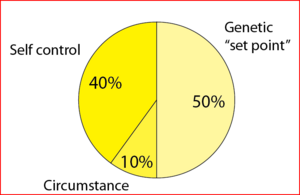Practicing positive activities may serve as an effective, low-cost treatment for people suffering from depression, according to researchers at the University of California, Riverside and Duke University Medical Center.
In “Delivering Happiness: Translating Positive Psychology Intervention Research for Treating Major and Minor Depressive Disorders,” a paper that appears in the August 2011 issue of the Journal of Alternative and Complementary Medicine, the team of UCR and Duke psychology, neuroscience and psychopharmacology researchers proposed a new approach for treating depression — Positive Activity Interventions (PAI).
PAIs are intentional activities such as performing acts of kindness, practicing optimism, and counting one’s blessing gleaned from decades of research into how happy and unhappy people are different. This new approach has the potential to benefit depressed individuals who don’t respond to pharmacotherapy or are not able or willing to obtain treatment, is less expensive to administer, is relatively less time-consuming and promises to yield rapid improvement of mood symptoms, holds little to no stigma, and carries no side effects.
More than 16 million U.S. adults — about 8 percent of the population — suffer from either major or chronic depression. About 70 percent of reported cases either do not receive the recommended level of treatment or do not get treated at all, according to the National Institute of Mental Health. Globally, the World Health Organization estimates that depression affects more than 100 million people.
Although antidepressants can be lifesaving for some individuals, initial drug therapy produces full benefits in only 30 percent to 40 percent of patients. Even after trying two to four different drugs, one-third of people will remain depressed.
The research team — Kristin Layous and Joseph Chancellor, graduate students at UC Riverside; Sonja Lyubomirsky, professor of psychology and director of the Positive Psychology Laboratory at UC Riverside; and Lihong Wang, M.D., and P. Murali Doraiswamy, M.B.B.S., FRCP, of Duke University — conducted a rigorous review of previous studies of PAIs, including randomized, controlled interventions with thousands of normal men and women as well as functional MRI scans in people with depressive symptoms.
“Over the last several decades, social psychology studies of flourishing individuals who are happy, optimistic and grateful have produced a lot of new information about the benefits of positive activity interventions on mood and well-being,” Lyubomirsky said.
However, such findings have not yet entered mainstream psychiatric practice.
“Very few psychiatrists collaborate with social scientists and no one in my field ever reads the journals where most happiness studies have been published. It was eye-opening for me as a psychopharmacologist to read this literature,” Doraiswamy said.









